Fruit vs. sugar and dairy
Fruit: 1) Turkey, 2) Belgium, 3) Portugal, 4) Italy, 5) Greece, 6) Spain
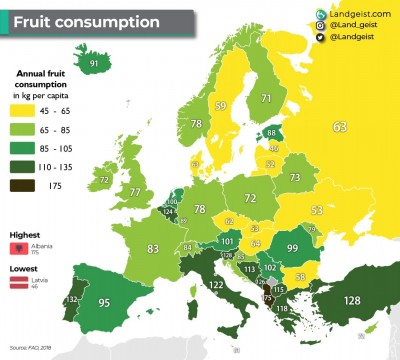
Sugar: 1) Belgium, 2) Switzerland, 3) Nederland, 4) Germany, 5) France, 6) United Kingdom (source)
Dairy: 1) Finland, 2) Nederland, 3) Switzerland, 4) United Kingdom, 5) Italy, 6) France
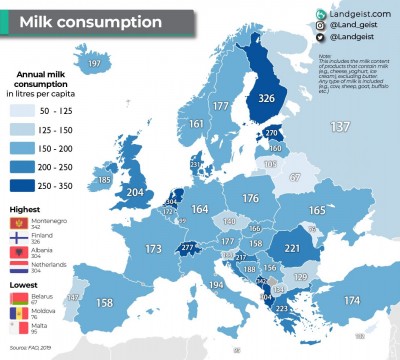
In Spain the dessert is usually fruit. Although having fruit after other food that have a slow digestion, such as meat, fish or grains, is not ideal, it is better than having a dairy product as dessert. For example, the common French dessert is a yogurt or cheese. Fruit is better than a sweet dessert as well, as Swiss or German people do.
Mediterranean countries are found in the list of the top countries of fruit consumption in Europe and at the bottom in sugar consumption, while the northern and central countries are champions in sugar and dairy intake and the last ones in fruit.
Meat vs. fish
In this case the comparison is not so straightforward. Some southern Europe, such as Spain, have a high intake of fish and a low intake of meat. Germany is a clear case or northern Europe that are high in meat and low in fish.
But other countries fall in the opposite category. Italy, for example, is a southern country with a considerably high meat intake compared with the fish one. And a northern country such as Norway, are champions in fish and low in meat.
The high amount of fish is pointed as one of main keys in two of the healthiest diets: Mediterranean and Okinawa (Japan). But there are other countries where the fish consumption is even higher than Mediterranean and Japan.
In this FAO (Food and Agriculture Organisation) animated graph you will see that the higher consumers of fish per capita from 1962 to 2018 have been Island, Maldives, Kiribati, Hong Kong, Macao and Portugal, exchanging positions depending on the year. Japan has occupied the third and fourth position for many years, but since 2006 it has been losing positions, and last decade it has situated below the top ten. Spain has never been between the top ten consumers of fish, and Portugal is the only Mediterranean country that has been in that list.
So I don’t think the consumption of fish to be one of the most important reasons of the success of the Mediterranean diet.
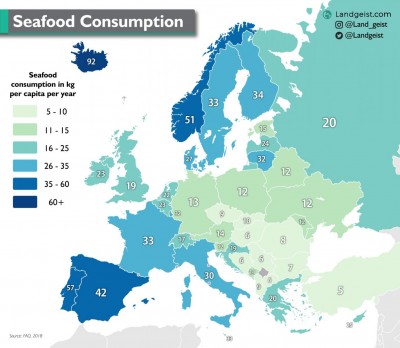
Vegetables
1) Turkey, 2) Greece, 3) Spain, 4) Italy, 5) Portugal, 6) France
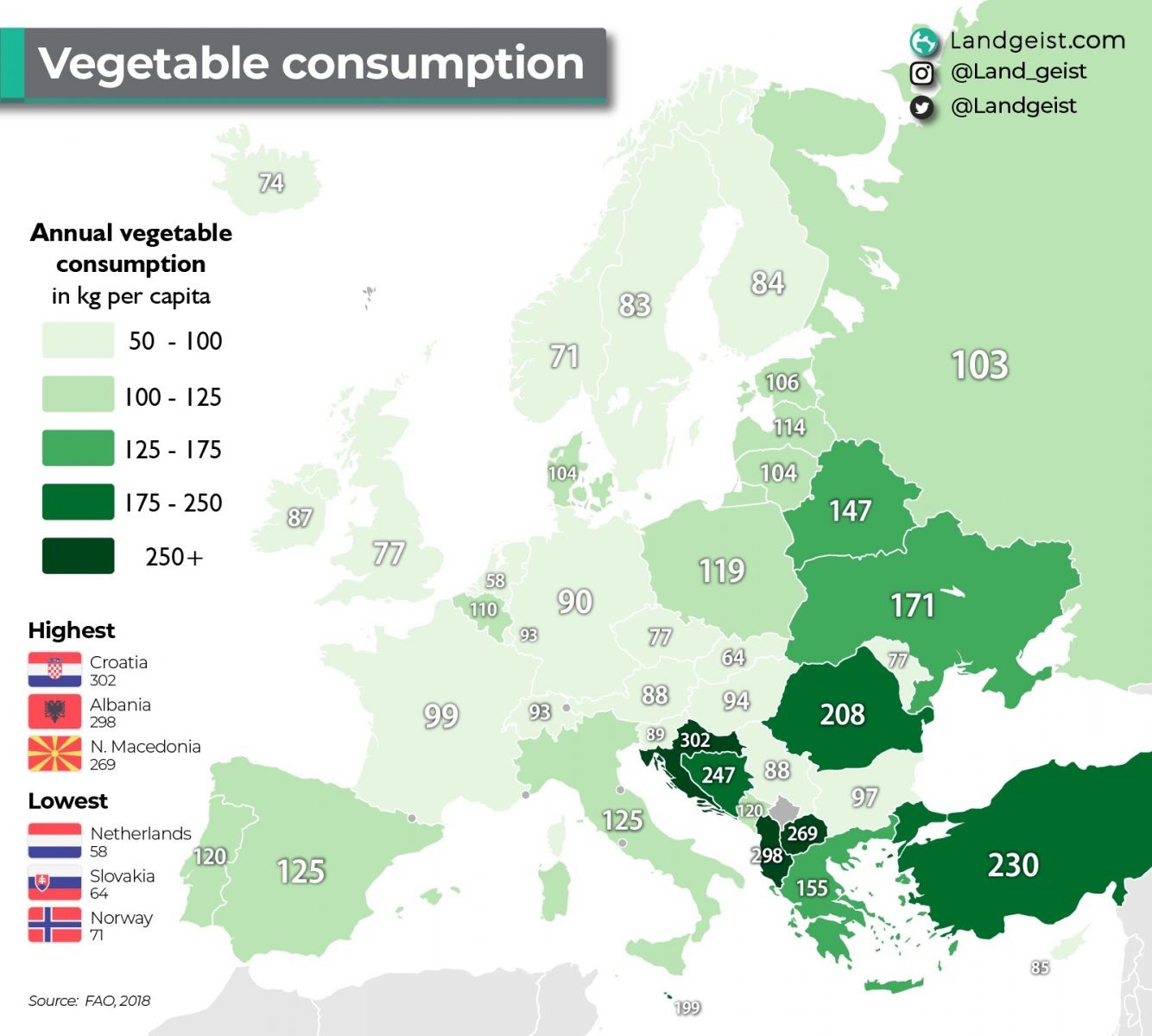
The amount of vegetables eaten in the Mediterranean area is clearly superior to the amount eaten in the central and northern Europe.
Olive oil vs. butter
In the Mediterranean Europe olive oil is the main fat for cooking, while in northern and central Europe butter and animal fat is the preferred fat.
Contrary to most olive oil advertising, proclaiming to be the main responsible of the reputation of the Mediterranean diet to be so healthy, I don’t think that having a high intake of olive oil benefits the health of Mediterranean people. I think that it is because the olive oil replaces butter, margarine and animal fats, which are much unhealthier than oil.
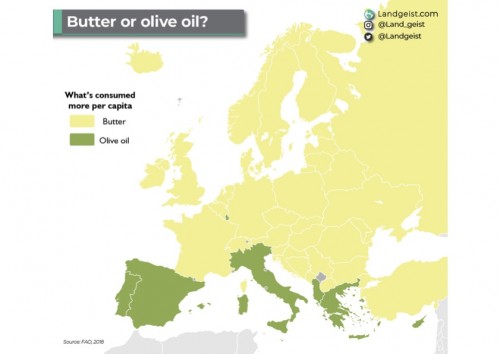
Rice
1) Turkey, 2) Portugal, 3) Spain, 4) Belgium, 5) Italy, 6) France
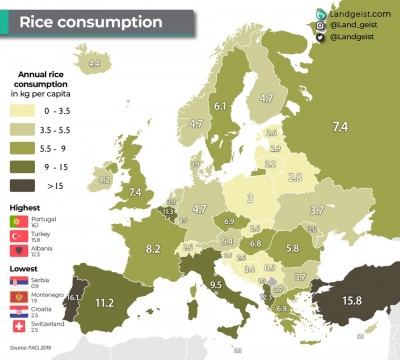
The consumption of rice in the Mediterranean Europe is generally higher than in the central and northern Europe.
Rice usually replaces wheat as grain source of carbohydrates. In Spain several different main course are rice based dishes, such as paella, instead of wheat based dishes, such as pasta or pizza.
Whole grains and legumes
I couldn’t find free stats about whole grain consumption in Europe, but as Spanish person that has been in different Mediterranean countries and other European countries, I can affirm that the whole grain consumption is marginal; grains are refined.
Neither I couldn’t find specific data about the consumption of legumes, but it is true that in Mediterranean Europe legumes are more frequently consumed than in the central or northern Europe. It is possible that the replacement of wheat or meat by legumes based dishes to be an advantage in the Mediterranean diet.
Nuts
Although I couldn’t find free stats about the consumption of dried nuts in Europe, I have found the consumption of almonds in Europe:
1) Spain, 2) Nederland, 3) Greece, 4) Tunisia, 5) Italy, 6) Germany (source)
Concerning almonds, it is true that their consumption is higher in the Mediterranean Europe. It is possible that the same applies to hazelnuts, pinenuts and pistacchios.
Nuts are used in Spain to make sweet desserts (such as turrón, polvorones, cocas, mazapán, panellets, tarta de Santiago), in snacks, or even as aperitif. They are also included in some dishes (such as Catalan spinach, stuffed chicken, sauces, pesto). So it is usually a replacement of wheat flour in bakery, desserts and snacks, although it can replace fruit in some desserts or snacks.
For example, in Spain the main ingredient of Christmas sweets is almonds, instead of wheat flour found in Italian panettone, German Stollen, or English ginger cookies.
Again, I don’t think that the properties of nuts by themselves are the advantage of the Mediterranean diet, but because they replace other worse ingredients such as wheat flour.
Conclusion
I think that the keys of the Mediterranean diet are the high consumption of fruit and vegetables, of olive oil instead of butter, of fruit instead of sugar and dairy, of rice and nuts instead of wheat, and occasionally, legumes replacing meat or grains.
I would not give so much relevance to the consumption of fish and whole grains in the Mediterranean diet.
Fruit: 1) Turkey, 2) Belgium, 3) Portugal, 4) Italy, 5) Greece, 6) Spain

Sugar: 1) Belgium, 2) Switzerland, 3) Nederland, 4) Germany, 5) France, 6) United Kingdom (source)
Dairy: 1) Finland, 2) Nederland, 3) Switzerland, 4) United Kingdom, 5) Italy, 6) France

In Spain the dessert is usually fruit. Although having fruit after other food that have a slow digestion, such as meat, fish or grains, is not ideal, it is better than having a dairy product as dessert. For example, the common French dessert is a yogurt or cheese. Fruit is better than a sweet dessert as well, as Swiss or German people do.
Mediterranean countries are found in the list of the top countries of fruit consumption in Europe and at the bottom in sugar consumption, while the northern and central countries are champions in sugar and dairy intake and the last ones in fruit.
Meat vs. fish
In this case the comparison is not so straightforward. Some southern Europe, such as Spain, have a high intake of fish and a low intake of meat. Germany is a clear case or northern Europe that are high in meat and low in fish.
But other countries fall in the opposite category. Italy, for example, is a southern country with a considerably high meat intake compared with the fish one. And a northern country such as Norway, are champions in fish and low in meat.
The high amount of fish is pointed as one of main keys in two of the healthiest diets: Mediterranean and Okinawa (Japan). But there are other countries where the fish consumption is even higher than Mediterranean and Japan.
In this FAO (Food and Agriculture Organisation) animated graph you will see that the higher consumers of fish per capita from 1962 to 2018 have been Island, Maldives, Kiribati, Hong Kong, Macao and Portugal, exchanging positions depending on the year. Japan has occupied the third and fourth position for many years, but since 2006 it has been losing positions, and last decade it has situated below the top ten. Spain has never been between the top ten consumers of fish, and Portugal is the only Mediterranean country that has been in that list.
So I don’t think the consumption of fish to be one of the most important reasons of the success of the Mediterranean diet.

Vegetables
1) Turkey, 2) Greece, 3) Spain, 4) Italy, 5) Portugal, 6) France

The amount of vegetables eaten in the Mediterranean area is clearly superior to the amount eaten in the central and northern Europe.
Olive oil vs. butter
In the Mediterranean Europe olive oil is the main fat for cooking, while in northern and central Europe butter and animal fat is the preferred fat.
Contrary to most olive oil advertising, proclaiming to be the main responsible of the reputation of the Mediterranean diet to be so healthy, I don’t think that having a high intake of olive oil benefits the health of Mediterranean people. I think that it is because the olive oil replaces butter, margarine and animal fats, which are much unhealthier than oil.

Rice
1) Turkey, 2) Portugal, 3) Spain, 4) Belgium, 5) Italy, 6) France

The consumption of rice in the Mediterranean Europe is generally higher than in the central and northern Europe.
Rice usually replaces wheat as grain source of carbohydrates. In Spain several different main course are rice based dishes, such as paella, instead of wheat based dishes, such as pasta or pizza.
Whole grains and legumes
I couldn’t find free stats about whole grain consumption in Europe, but as Spanish person that has been in different Mediterranean countries and other European countries, I can affirm that the whole grain consumption is marginal; grains are refined.
Neither I couldn’t find specific data about the consumption of legumes, but it is true that in Mediterranean Europe legumes are more frequently consumed than in the central or northern Europe. It is possible that the replacement of wheat or meat by legumes based dishes to be an advantage in the Mediterranean diet.
Nuts
Although I couldn’t find free stats about the consumption of dried nuts in Europe, I have found the consumption of almonds in Europe:
1) Spain, 2) Nederland, 3) Greece, 4) Tunisia, 5) Italy, 6) Germany (source)
Concerning almonds, it is true that their consumption is higher in the Mediterranean Europe. It is possible that the same applies to hazelnuts, pinenuts and pistacchios.
Nuts are used in Spain to make sweet desserts (such as turrón, polvorones, cocas, mazapán, panellets, tarta de Santiago), in snacks, or even as aperitif. They are also included in some dishes (such as Catalan spinach, stuffed chicken, sauces, pesto). So it is usually a replacement of wheat flour in bakery, desserts and snacks, although it can replace fruit in some desserts or snacks.
For example, in Spain the main ingredient of Christmas sweets is almonds, instead of wheat flour found in Italian panettone, German Stollen, or English ginger cookies.
Again, I don’t think that the properties of nuts by themselves are the advantage of the Mediterranean diet, but because they replace other worse ingredients such as wheat flour.
Conclusion
I think that the keys of the Mediterranean diet are the high consumption of fruit and vegetables, of olive oil instead of butter, of fruit instead of sugar and dairy, of rice and nuts instead of wheat, and occasionally, legumes replacing meat or grains.
I would not give so much relevance to the consumption of fish and whole grains in the Mediterranean diet.











 Gemma Calzada es doctora en Salud Holística y terapeuta GAPS. Su objetivo es mejorar la salud con la nutrición y el estilo de vida, y ayudar a las personas que sufren intolerancias alimentarias a vivir felices.
Gemma Calzada es doctora en Salud Holística y terapeuta GAPS. Su objetivo es mejorar la salud con la nutrición y el estilo de vida, y ayudar a las personas que sufren intolerancias alimentarias a vivir felices. 
